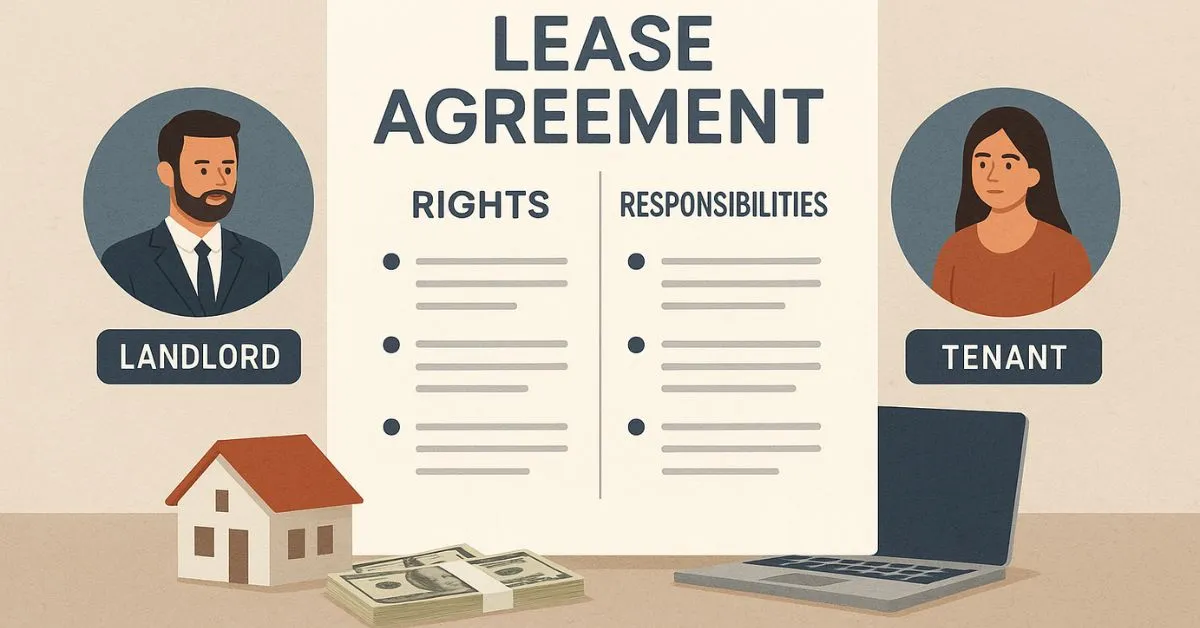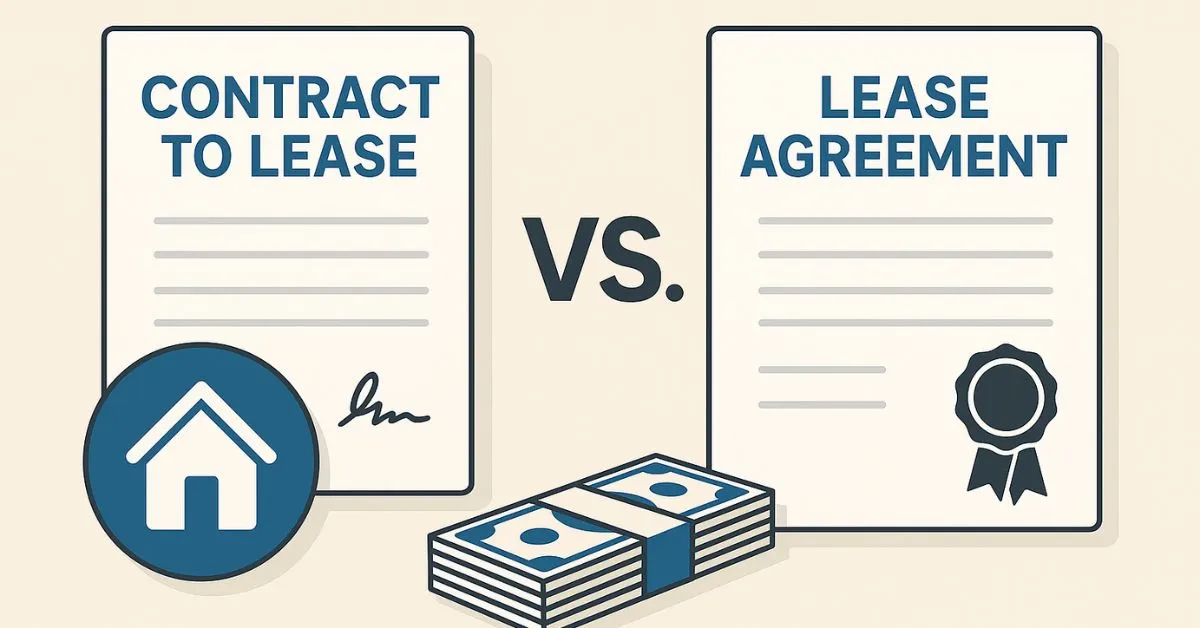One common area of confusion is the difference between a contract to lease and a lease agreement. These two documents, while related, serve distinct purposes in the rental process.
A contract to lease is a preliminary agreement. It outlines the terms under which a lease will be signed in the future. On the other hand, a lease agreement is a legally binding document that formalizes the rental arrangement between a landlord and tenant.
Understanding these differences is crucial. It ensures legal compliance and protects the interests of both parties. It also contributes to a profitable and stress-free property investment experience.
Understanding the Basics: Contract to Lease
A contract to lease is often the first step towards formalizing a rental agreement. It sets the stage for future leasing by outlining essential terms like rental rate, security deposit, and lease duration. This preliminary document serves as a roadmap for the parties involved.
Typically, this contract includes specific contingencies that need to be met before a formal lease agreement is executed. These might involve conditions related to property conditions, financing, or repairs. While not always legally binding, a contract to lease can establish expectations and prevent misunderstandings between the landlord and prospective tenant. This might also be called something like a “property reservation agreement” or other similar names. In Georgia, we use this specifically so that we can collect a reservation fee before the move-in inspection is completed, as Georgia requires the inspection to be completed before a security deposit can be collected.
What is a Lease Agreement?
A lease agreement is a legally binding document that formalizes the rental relationship between a landlord and tenant. It details all the terms agreed upon, including rent amount, payment schedules, and duration. This document provides both parties with clear rights and responsibilities throughout the rental period.
Importantly, a lease agreement also includes clauses about maintenance, termination procedures, and dispute resolution. It must comply with local housing laws, ensuring the protection of both tenant and landlord interests. A well-crafted lease agreement helps minimize disputes and fosters a smooth rental experience.
Key Differences Between Contract to Lease and Lease Agreement
Understanding the differences between a contract to lease and a lease agreement is crucial for property owners and investors. Each serves a unique purpose in property management, ensuring smooth transactions and safeguarding interests.
The primary distinctions include:
- Contingencies and Conditions: A contract to lease often contains specific contingencies that must be fulfilled before the lease agreement is finalized. These could involve inspections or pending legal approvals.
- Legal Binding Status: Unlike a lease agreement, which is fully binding upon signing, a contract to lease may remain non-binding until specified conditions are met. This aspect allows for flexibility in negotiations. However, this isn’t always the case. Some contracts to lease may be fully legally binding in the sense that the person is committing to lease and will lose their money if they do not move forward, but it still doesn’t obligate them to actually sign a lease and move in.
- Timing and Availability: A contract to lease is particularly useful when a property is not immediately ready for occupancy. It serves as a temporary agreement that holds the unit for the prospective tenant until they can move in. These differences highlight the importance of selecting the appropriate document for each stage of the rental process. Understanding these nuances helps avoid common pitfalls in real estate investment.
The Role of Contingencies in a Contract to Lease
Contingencies are pivotal in shaping a contract to lease. They specify conditions that must be satisfied before a formal lease is executed. These conditions often involve financial approvals, property repairs, or tenant background checks.
Including contingencies provides both landlords and tenants flexibility and assurance. It ensures that both parties can address any outstanding issues before fully committing. This approach minimizes potential conflicts and misunderstandings later. By clearly stating contingencies, the contract acts as a roadmap, guiding both parties toward a smooth transition to the lease agreement stage. Understanding these elements is vital for successful property management.
Lease Agreement: Rights and Responsibilities Detailed
A lease agreement is a binding document detailing rental terms for both the landlord and tenant. It outlines responsibilities such as rent payment, property maintenance, and repair procedures. The tenant must adhere to these terms to ensure a harmonious rental experience.

On the other hand, landlords also have obligations. They must maintain a habitable property and address repairs promptly. Lease agreements also include clauses on renewals and terminations. These details help mitigate disputes and foster positive tenant relationships. Understanding these responsibilities ensures that both parties meet their obligations, contributing to property and tenant satisfaction.
Navigating Atlanta's Rental Market: Local Laws and Regulations
Atlanta's rental market has specific regulations that property owners must follow. Understanding these local laws is essential for compliance and avoiding legal issues. Housing laws in Atlanta cover aspects such as security deposits, eviction procedures, and notice requirements.
Staying informed about these regulations ensures smooth property management. It's crucial to incorporate these legal stipulations into lease agreements for enforceability. Compliance not only protects property owners but also cultivates trust with tenants. Effective lease documentation, aligned with local standards, lays the foundation for a successful rental property experience in Atlanta's competitive market.
The Importance of Tenant Satisfaction and Retention
Tenant satisfaction is key to maintaining a profitable rental property. Happy tenants are more likely to stay longer, reducing turnover costs. Retaining tenants ensures a steady rental income and minimizes vacancy periods.
Addressing tenant issues promptly can enhance satisfaction levels. Regular maintenance and open communication contribute to a positive renting experience. When tenants feel valued, they tend to respect the property and renew their leases. In the long run, investing in tenant relations pays off by safeguarding your property's profitability and reputation. A focus on tenant satisfaction ultimately strengthens the landlord-tenant relationship and benefits both parties.
How Professional Property Management Can Help
Professional property management services can transform your rental experience. They handle tenant inquiries and enforce lease terms, reducing your workload. With in-depth knowledge of local laws, they ensure compliance and protect your investment.

Beyond managing leases, these experts address maintenance issues swiftly and efficiently. They also develop strategies to enhance tenant satisfaction and retention. Professional managers provide peace of mind by alleviating the complexities of property management. By partnering with a reputable firm, property owners and investors can focus on growing their portfolios and achieving long-term financial success.
Real-Life Scenarios: Contract to Lease vs Lease Agreement
Imagine you're finalizing a rental with a tenant who's unsure of their moving date. A contract to lease secures their intent while details firm up. Later, when terms are final, the lease agreement formalizes obligations. This process reduces disputes, ensuring clear expectations for both parties involved.
Conclusion: Achieving a Profitable Investment with Proper Documentation
Understanding the nuances between a contract to lease and a lease agreement is crucial. Proper documentation protects your investment and promotes tenant satisfaction. By leveraging professional property management services, property owners and investors can navigate complexities confidently, ensuring compliance and enhanced profitability in the competitive Atlanta rental market.


